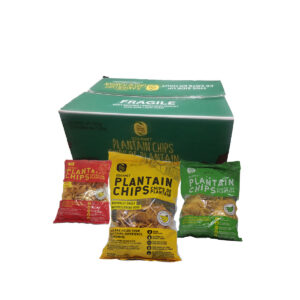Plantain chips, a beloved snack enjoyed by millions around the world, have a rich history that stretches back centuries. These crispy, savory slices of fried or baked plantains have not only become a staple in many diets but have also had a significant impact on the global food industry. In this write-up, we will explore the origins of plantain chips and how they shaped the world’s food industry.


The Origin
It’s Ancient Roots in West Africa
The story of plantain chips begins in West Africa, where plantains have been a dietary staple for centuries. Plantains, a close relative of bananas, were domesticated in this region over 4,000 years ago. They were a crucial source of sustenance, providing a reliable source of carbohydrates and essential nutrients to the people of West Africa.
Preservation through Sun-Drying
In the tropical climate of West Africa, where plantains are abundant, the need for preservation methods was essential. The method of sun-drying plantains to extend their shelf life was developed. Thinly sliced plantains were left out to dry in the sun, a process that not only preserved them but also intensified their flavor.
Evolution into Fried Snacks
As trade routes expanded, so did the culinary influence of West Africa. Plantain chips made their way into the diets of many other cultures, including those in the Caribbean and Central America. Here, the preparation of plantain chips evolved, with frying replacing sun-drying. This new method not only preserved the plantains but also created a crispy, delicious snack.
The Impact on the Food Industry
1. Global Demand and Production
Over time, plantain chips gained immense popularity not only in regions where plantains grew but also in countries around the world. As demand increased, so did production. Today, plantain chips are produced on an industrial scale, making them readily available in supermarkets and convenience stores globally.
2. Diverse Flavors and Varieties
Plantain chips have evolved beyond their traditional roots, with a wide array of flavors and varieties now available. From spicy chili to sweet cinnamon and even chocolate-covered versions, these chips have captured the taste buds of people from diverse backgrounds.
3. Healthy Snacking Alternative
Plantain chips have gained recognition as a healthier alternative to traditional potato chips. They are gluten-free, rich in fiber, and provide essential vitamins and minerals. This appeal has led to a growing demand for plantain chips among health-conscious consumers.
4. Cultural Exchange
Plantain chips have become a symbol of cultural exchange and culinary fusion. They are featured in various international cuisines and fusion dishes, showcasing how food can transcend geographical boundaries and bring people together.
5. Economic Impact
The production and export of plantain chips have become significant contributors to the economies of countries where plantains are grown. This has created job opportunities and stimulated economic growth in these regions.
Though born out of necessity in West Africa, plantain chips, have evolved into a global snack sensation that has left an indelible mark on the food industry. Their journey from sun-dried preservation to crispy fried snacks is a testament to the adaptability and creativity of culinary traditions. Plantain chips have not only shaped diets around the world but have also played a role in cultural exchange and economic development. As they continue to evolve and diversify, it’s clear that plantain chips will remain a beloved and influential snack for generations to come.

African and Carribean Foods, Imported to Canada
Ugonwa’s® is a specialty retail (online and store-front), with a great variety of African-Caribbean top-quality, kosher/halal meats and fishes, wholesome staple foods and produce, as well as authentic Afro-Caribbean fashion and Arts. Our niche spans across North America and the global market.

